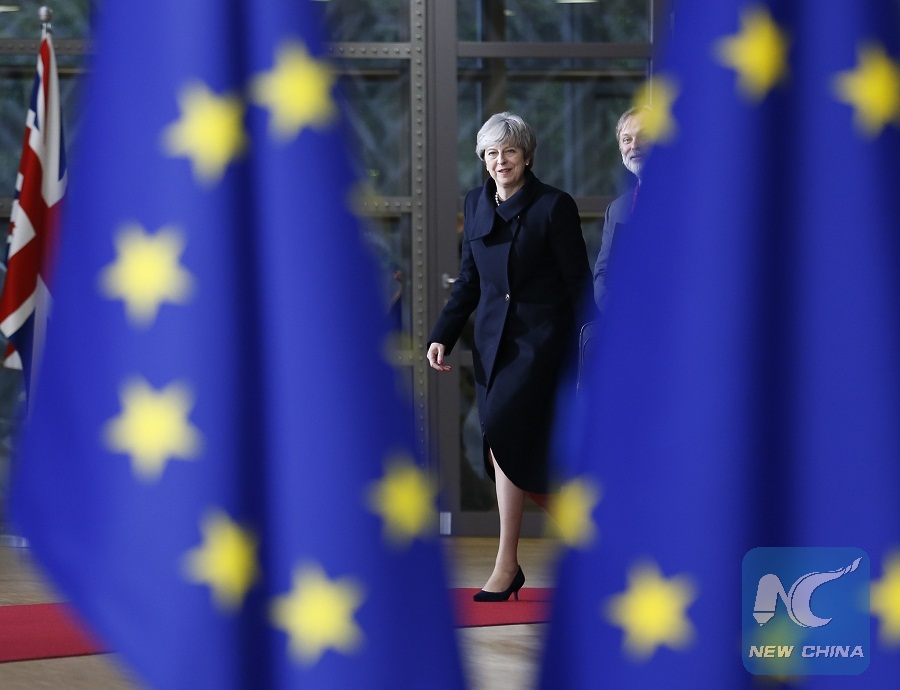
British Prime Minister Theresa May arrives at the EU headquarters for an EU Summit in Brussels, Belgium, Dec. 14, 2017. (Xinhua/Ye Pingfan)
by Xinhua writers Zhai Wei, Shuai Rong
BRUSSELS, Jan. 13 (Xinhua) -- The post-Brexit budget of the European Union (EU) is to pose a test for its unity when the bloc is under pressure to draw its blueprint for the next multi-year financial framework after Britain leaves a big hole in it.
It is estimated that Britain, as a net contributor to the EU budget, will after its exit leave a shortfall of more than 12 billion euros (14.6 billion U.S. dollars) per year in the budget. With its current seven-year budget period ending in 2020, the EU's executive arm European Commission (EC) plans to present the blueprint of the next multi-year budget in May.
However, the pressure facing the EU is not confined to the reduced receipts by Brexit. The bloc has set new goals in areas such as migration, internal and external security, among others, incurring more expenditures. This may result in a much larger financial gap.
EC chief Jean-Claude Juncker on Jan. 8 called on the 27 members states to pay more money into the bloc's coffers. Juncker said the next EU budget should be more than 1 percent of the bloc's gross domestic product (GDP).
Juncker also implied there would be less money for some programs. The cohesion policy and the common agricultural policy (CAP) are likely to be the worst hit.
However, it's easier to be said than done. Either increasing contributions or scrapping projects may make some member states unhappy.
A financial reduction in cohesion policy may create a negative dynamic among the central and eastern European countries.
European media Euroactive reported the Hungarian and Polish governments on Monday expressed their readiness to contribute more to the next EU financial framework after Brexit but are not in favor of cuts in the cohesion policy spendings.
A polish official described planned cuts in cohesion policy as being "too simple," arguing the policy has proven its added value and "has a bright future" after reforms.
Under cohesion policy, there have been large amounts of money transferred from the richer west to eastern countries including Poland, Slovakia and Hungary.
EU statistics show Poland is the biggest single beneficiary of EU budgets. Last year, it received 7.1 billion euros (8.7 billion dollars) more than it contributed to the EU budget. For the current seven-year budget period, such kind of fund transfers to EU's poor members are estimated to total 325 billion euros (396 billion dollars).
Richer members are expected to be reluctant. "I think it is unlikely that the net payers will be happy to fill this gap completely or unconditionally," said Fabian Zuleeg, chief executive and chief economist of the think tank European Policy Center.
It seems things will become more complicated when there are already tensions over migration and Poland's judicial overhaul between Brussels and the central and eastern European countries.
"The danger is that it creates further tension or fragmentation between the member states," said Zuleeg.
Juncker has voiced the hope for the EU member states to strike an agreement before the election of EU institutions in the spring of 2019.
The EU unity is expected to be strongly tested with budget negotiations likely to turn into a major political battle among members in the next months.

